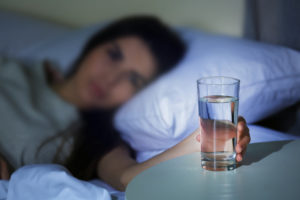Sleep Deprived and Dehydrated

Has it ever occurred to you that if you haven’t gotten enough sleep you should drink some water?
The idea of hydration and sleep being related is not all that obvious or intuitive. When you get up from a too-short night of sleep or one where you didn’t sleep well, and you feel like…well…crap warmed over, having a nice glass of water is probably one of the last things you think of to help get you up and going.
Many of us tend to rush for the nearest coffeepot, coffee shop, or can of pop to feel human again after a short or rough night of sleep. Hey, it’s been working all these years, so why not?
Yes, caffeine is a miracle picker upper. But that draggy, achy, zombie feeling you get when you haven’t slept enough may be as much about your being dehydrated as it is being sleep deprived.
In late 2018, Penn State issued a study showing a correlation between lack of adequate sleep and hydration levels in adults from both the U.S. and China. In both countries, they found that adults getting six or less hours of sleep had a greater likelihood of being dehydrated than those who slept 8 hours. The subjects self-reported their hours of sleep and submitted urine samples to measure their level of hydration.
The study suggests that inadequate sleep may contribute to dehydration, and dehydration can make you feel bad and damage your health in all sorts of ways.
In addition to making you feel extremely tired, fatigued, or sleepy, it can contribute to or cause headaches, low blood pressure, dry mouth and skin. It can make you feel dizzy or lightheaded and can make you experience heart flutter or palpitations. Chronic dehydration can cause kidney stones, kidney failure, seizures, and more.
It’s not good.
Why Does Not Getting Enough Sleep Make You Dehydrated?
The cause appears to be related to a hormone called vasopressin. Also known as an antidiuretic hormone (ADH), vasopressin regulates the level of hydration in our bodies. It also has a role in regulating our circadian rhythm.
Vasopressin releases throughout the 24-hour day, but in the wee hours of the morning a burst releases, causing the body to keep more of its fluid in and around its cells. This, in turn, causes the kidneys to produce more concentrated urine since they have less water to work with. It’s why your pee is so dark when you first go in the morning.
The study suggested that if we wake up too early or simply miss out on a full eight hours of sleep, we miss that burst of vasopressin. Our cells, instead of holding on to water, send it to the kidneys which produce more diluted urine. And thus, dehydration.
While the answer to this dehydration would seem to be to just drink more water (and drinking more water is rarely a bad thing), the study suggests that it’s the inadequate amount of sleep that’s actually causing the dehydration, not necessarily too little water intake.
So, what lessons can we take away from this study?
- Waking up dehydrated is a bad way to start the day if you like feeling good.
- Getting to bed earlier and making sure you get a full night’s sleep will help you prevent early morning dehydration and yucky feeling.
- Drinking plenty of water throughout your day, but not too much right before bedtime, is always a good idea.
After all, dehydration doesn’t feel good, but no one wants a case of nocturia either, right?
Look it up.
